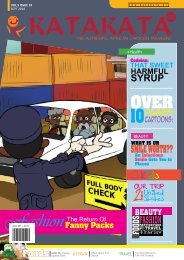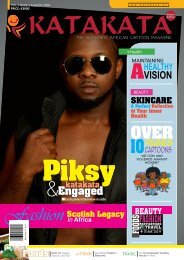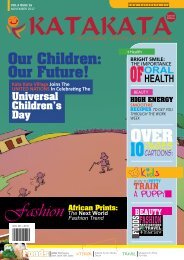You also want an ePaper? Increase the reach of your titles
YUMPU automatically turns print PDFs into web optimized ePapers that Google loves.
BEAUTY
By Romolo Pusceddu
lobally, things are changing
very fast with a lot of social
metamorphoses. The emerging
trends in the beauty industry
have brought about tremendous progress
in the world and have equally re-define
the use of makeup and challenged the
definition of gender.
An online survey conducted by the
Morning Consult, a global and privately
held technology and media based in the
United States of America showed that 33
per cent of men ages 18 to 29 and another
30 percent of men ages 30-44 said they
would consider applying makeup.
More gender inclusivity was achieved
in 2018,
following
the
launch of
Gender redefinition:
A new TWIST in the
use of makeup by men
Meaning is multiple;
the meaning of
meaning depends
on the context. So
is identity, which
is never single or
pre-given. Have you
ever thought of
the definition of
the word “woman,”
“man,” cosmetics”
“makeup?” Well,
perhaps, many years
ago, such definitions
would not have
posed any difficulty.
Not anymore.
In the past centuries, makeup was
associated with the woman; this is
hardly the case in our modern era. Men,
especially born in the mid-90s and early
2000s, have embraced makeup to beat
gender stereotypes.
“Back then, men’s makeup was virtually
unheard of and men were very much
of the mindset that they had to be
stereotypical ‘hurly-burly blokes’,” said
Alex Dalley, the pioneer of UK’s largest
makeup for men brand known as MMUK
MAN.
He added, “The average male grooming
routine for men at that time was perhaps
a shampoo and shower gel and maybe
a moisturiser for the forward thinkers.
At that time the concept of MMUK was
almost offensive to people and judged as
an attack on their masculinity.”
Since 2017 there has been a breakthrough
in the use of makeup by men due to
the introduction of boundary-breaking
brands such as Covergirl, Milk Makeup,
Make Up For Ever, E.l.f. Cosmetics.
a channel dubbed as Boy De Chanel, a
line of men producing products with an
undetected presence in South Korea. The
chanel’s PR and Communications officer
said beauty should be pegged on style, not
gender.
Before the inauguration of Boy De Chanel,
men did not want to be seen wearing
up makeup or purchasing them. They
were afraid of being ridiculed and called
feminine.
“Many customers would use different
names when ordering and ask that their
parcels be delivered in plain envelopes,
with no reference to makeup on them
whatsoever. Discretion was paramount
for customers when we began building
the brand and helping men find the
right products was tricky for an online
business,” reiterated Alex Dalley.
Millennials have become the main targets
of the brand companies due to their
positive attitudes towards the products
and Social Media, where they can access
more information about makeup.
20
2020 Issue 24 SPECIAL EDITION Kata Kata cartoon magazine
















